Cat Language
by Fenesi Péter
I created a cat language dictionary, and it really works with my cats. As you will see, the cat verbal communication is very similar to the human language. Cats, just like people, use words with a definite meaning. As I identified the meaning of some words, and started to use them, and my cats became more chatty.
People can use different words to call a cat, but I'm using the "MUE." This word has an easy pronunciation and can be easily understood by a cat. Although, the cat language can vary by how it is described and how it is pronounced by humans.

Be very careful designing your cat's vocabulary and communication. As a cat lover, you will soon find out that, by understanding and implementing cat language, you can minimize frustrations. While developing your cat's vocabulary, be sure to take in consideration your cats' body language and environment.
Here are my findings. Cats use these vowels to communicate:
á –(a) like in the word “what“
a - (a:) like in the word “last“
e – (æ)] like in the word “bed," “cat,” cats do not use long (æ)
é – (e) like in the word “get,” “ generation"
é: – this is a vocal similar to the previous, just longer
i – (i) like in the word “ship," cats do not use long (i)
o – (o) like in the word “hot,” “box," cats do not use long (o)
ö – (ə) like in the word “third," cats do not use long (ə)
u – (u) like in the word “wood,” “took"
u: - (u:) like in the word “fool"
Cat language also include consonants, such as: b, h, j, k, m, ny (as in "new"), r, v. In addition, cats use two long consonants: r: and m:. The b and h consonants are rare, but there.
The speed at which they are spoken, and whether they’re repeated or not, has an effect on the meaning of the words.
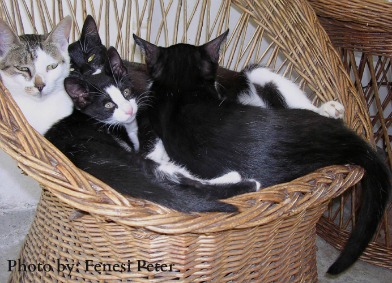
Short cat language dictionary:
á: (a:) - an invitation to play
á é é (a e e) (staccato) – I want to go out
á é u, á á u (a e u, a au) (staccato) – I want to come in, come in
áu (au) – a protest, an expression of dislike
áe (aæ) – thanks
é (e) – yes
éé (ee) – I want to go out
éá (ea) – greeting, hello
éá á (ea a) – rejection of friendship
éá:r (ea:r)– expression of friendship, flattery
éu (eu) – I don’t want to go out
éáu (eau) – I’d like to come in
hmé: (hme:) - threatening with attack
ié (ie)– I want out (strong demand)
iju, iju: (iyu, iyu:) - help, mother
já: (ya:) - yes
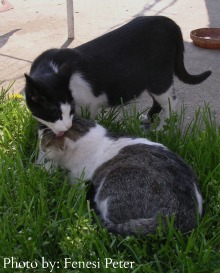
má: (ma:) - I love you, love me
máá (maa) – milk
má é (ma e) – let me be
má:r (ma:r) – flattery
máu: (mau:) - call for help, cry out
meé (mæe) – water, thirst
me? (mæ?) - what? (What do you want? What have you got? What will you do?)
me á é (mæ a e) – lack of water, asking for water
meéeé (mæeæe) – dry cat food
meme (mæmæ) (spoken fast) – sparrow, bird
meö (mæə) – meat, meaty food
mrá: (mra:) - come here
mráá: (mraa:) - protect me
miá (mia) - expression of content, expression of satisfaction
mijáu, mijáo, mijáou (miyau, miyao, miyaou) – expression of hunger, demanding food
mou: (mou:) - offering food, spoken hoarsely: boasting about a killed bird
mre (mræ) – call to attention
mrué (mrue) – follow me
mué (mue) – come
muer (muær) – what’s going on with you?
murá (mura) – fish
nyá, nyá: (nya, nya: ) – I’m here, listen to me
nyáé: á (nyae: a) – eat!
nyáu (nyau) – jealousy, expression of discontent
nyáu nyáu nyáu (spoken fast) – don’t come near my food
öe (əæ) – what are you doing? How are you?
öráu (ərau) – please come
rá:b (ra:b) – mother cat calls for her kittens
r:eö (r:æə) – kitten calls for its mother
rmá:, r:má: (rma:, r:ma: ) - don’t be afraid, everything’s OK
rmeö (rmæə) – mouse
rnyáo (rnyao) – dog, danger
rvá (rva) – accusation, blame
uá, uá: (ua, ua:) - stop it, you can’t do that, I do not like it
u:m: (u:m:) (with closed mouth) – threatening, less threatening as a growl
váo, váo-váo (vao, vao-vao) - no, I don’t want that
é: (e:) - out, outside
u: - inside
The meaning of some words might seem the same, but we can assume that there are nuances in their meaning. Cat language precise meaning is still to be discovered.
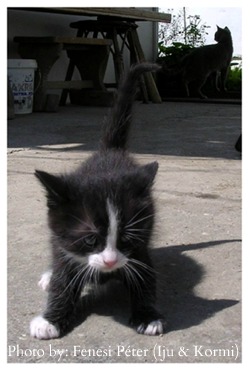
I use these words to communicate with my cats. They understand them, so they assume that I can understand their language. My cats often start making longer sentences, and when they notice I can't understand them, they look at me a little disappointed.
My tomcat is called Iju. When he wants to come in, he says "á á u" – very simple two words sentence. As Titi (my other cat) comes home and sees that the other cats already got food. She says "nyáu nyá" –meaning: "I want some food too."
I
hope that during a longer observation, I will be able to uncover more
particularities about the cat language. It’s amazing how open and chatty cats
become once you start talking to them in their language. You should try it!

If you uncover/discover the meaning of new words or phrases, please share with us. This is the fastest way to complete the dictionary.
My cat dictionary already came out in 2002, as a part of my book "A probable story about Jack and Jill." Since then, I have expanded my cat dictionary, and shared it with my friends.
Please feel free to share
with all cat lovers out there! You will be helping to bring cats and their
owners closer together. It’s worth it.
Return from Cat Language to Cat Communication
New! Comments
Have your say about what you just read! Leave me a comment in the box below.Healthy Cat Treat

Subscribe to Our Love Cats Digest e-zine
"A cat improves the garden wall in sunshine, and the hearth in foul weather." - Judith Merkle Riley
Marketing Strategies by






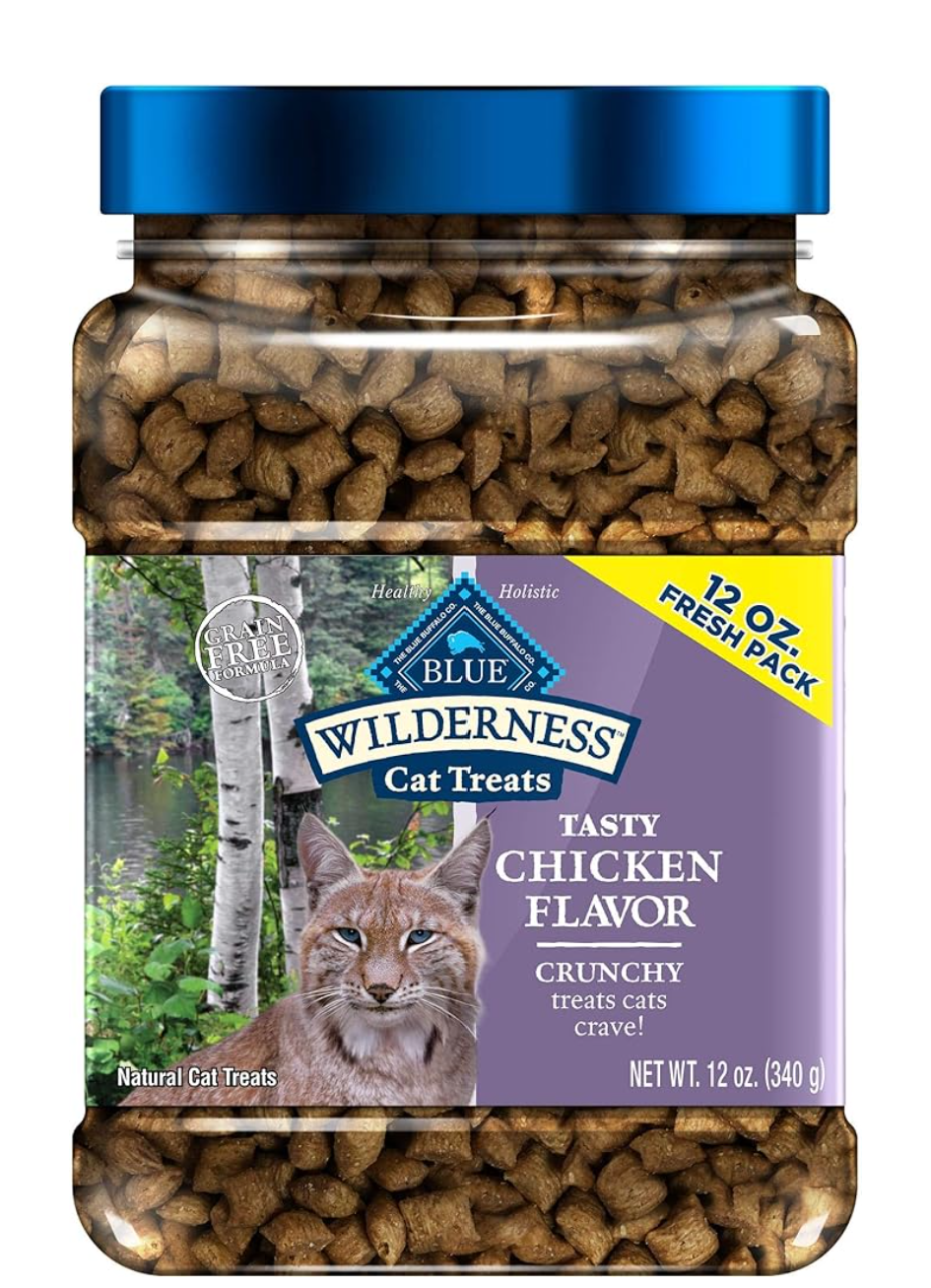
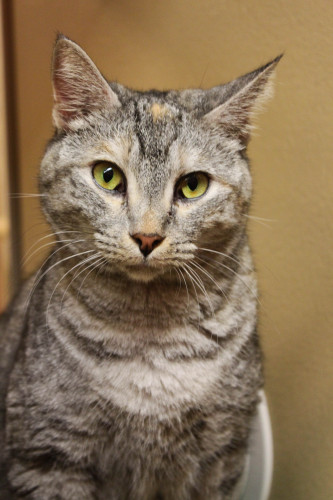

New! Comments
Have your say about what you just read! Leave me a comment in the box below.